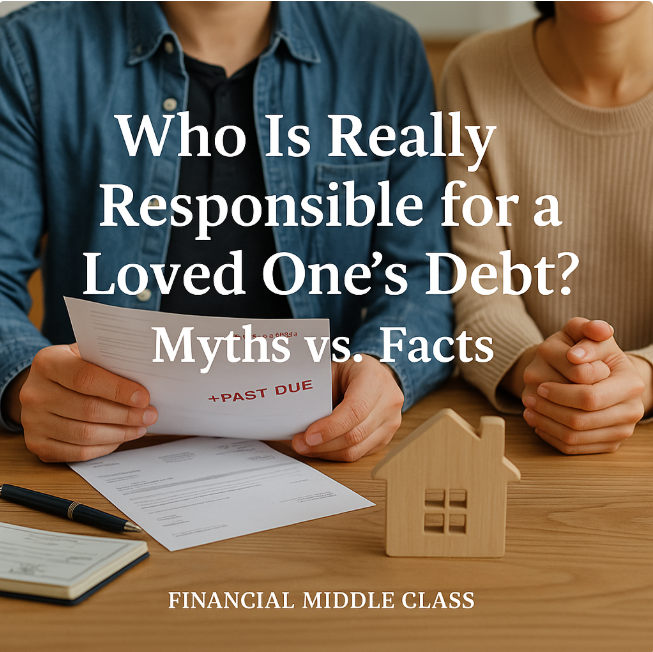When a loved one passes away, the grief can feel overwhelming. Unfortunately, that’s often the same moment when debt collectors, hospital billing departments, and credit card companies come calling. Many families panic, worried that they’ll be on the hook for their parent’s credit card, their spouse’s medical bill, or even a sibling’s personal loan.
The truth is, debt after death is complicated — but it’s also full of myths. Let’s break down what actually happens, what doesn’t, and how to protect yourself from unnecessary financial stress.
Myth #1: Children automatically inherit their parents’ debt
Fact: Debt is not passed down like family heirlooms. Credit card balances, medical bills, and personal loans are tied to the person who borrowed the money. When that person dies, the responsibility usually falls to their estate — the total of their assets (home, bank accounts, cars, etc.).
Unless you co-signed the loan or are a joint account holder, you are not personally responsible. A credit card company can’t simply demand payment from the children.
Example: If your mother passes with $15,000 in credit card debt, the bank can file a claim against her estate. If her estate has assets, the debt may be paid from those. If not, the debt is written off. You, as her child, don’t pay a dime.
Myth #2: A spouse always inherits all debts
Fact: It depends on the type of debt and the state where you live. In most states, spouses are not automatically responsible for each other’s individual debts. However, there are two major exceptions:
- Joint accounts or co-signed loans → If both spouses signed, both are liable.
- Community property states → In these states, most debts acquired during marriage are considered shared.
Which states are community property states?
Arizona, California, Idaho, Louisiana, Nevada, New Mexico, Texas, Washington, and Wisconsin (plus Alaska if both spouses opt in).
If you live in one of these states, you may be responsible for certain debts your spouse incurred during marriage, even if the account wasn’t in your name.
Myth #3: Medical debt always falls on the family
Fact: Medical debt follows the same rules as other debts — it’s paid from the estate. However, some states have “filial responsibility” laws that may hold adult children responsible for a parent’s unpaid medical bills. These laws are rarely enforced, but they’re worth knowing about.
Example: A nursing home in Pennsylvania once sued an adult son for his mother’s $93,000 care bill under a filial responsibility law. These cases are unusual but show why awareness matters.
Myth #4: Debt collectors can pressure family members into paying
Fact: Debt collectors can contact relatives to locate the executor or administrator of the estate — but they cannot demand payment from someone who isn’t legally responsible.
If you get a call, you can say:
“I’m not responsible for this debt. Please contact the estate’s representative.”
The Fair Debt Collection Practices Act (FDCPA) protects you from harassment or deceptive collection tactics.
Who is responsible for a loved one’s debt?
Let’s clear it up:
- The estate pays first.
- Co-signers or joint account holders remain liable.
- Spouses may be liable in community property states.
- No one else (children, siblings, friends) has personal responsibility.
If there are no estate assets, debts generally die with the debtor.
What you can do if you’re facing this situation
- Check the will and probate process – Debt repayment usually happens through probate.
- Request written proof of debt – Never pay a collector without verification.
- Consult state law – Rules differ between community property and common law states.
- Seek legal help if needed – Especially for large debts or if you’re in a community property state.
- Don’t rush – Collectors may try to pressure you immediately after a death. You have time.
📌 Related Reads from Financial Middle Class:
Call to Action
Don’t let myths about inherited debt cause extra stress during an already difficult time. Learn your rights, protect your finances, and take the next step by exploring the related articles in this series.

Pingback: Debt Collectors After Death: Know Your Rights- FMC
Pingback: Authorized User vs. Joint Account Holder: Key Differences Explaine
Pingback: Community Property vs. Common Law States: Marriage & Debt